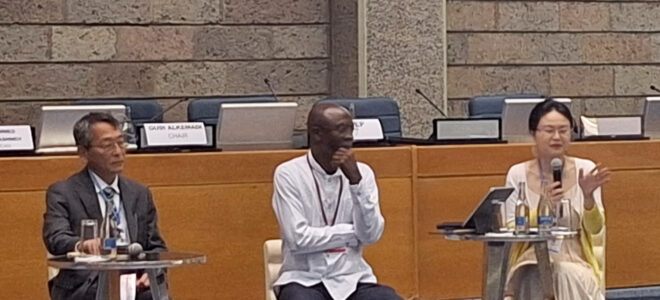The second session of the ad hoc Open-Ended Working Group (OEWG-2) on the Science-Policy Panel on Chemicals, Waste and Pollution Prevention is taking place in Nairobi, Kenya, from December 11 to December 15, 2023. Three IPCP Board Members are in attendance and are providing their daily summaries.
Today was the first of two days of preparatory meetings prior to the actual session of the OEWG. In the morning, after the opening of the meeting the government delegates shared first thoughts and reflections on the so-called “Skeleton outline for proposals for the establishment of a science-policy panel”, which provides a first description of the elements of the new panel. Then a session on Setting the Scene took place, chaired by Santos Virgilio, Ministry of Environment of Angola, and with Noriyuki Suzuki, National Institute for Environmental Studies, Japan, and Melissa Wang, Greenpeace and University of Exeter, as speakers. They pointed out that the new panel will be important for a stronger scientific input into international chemicals management and for a more comprehensive scientific coverage of the many and diverse chemical pollution problems, as a basis for a more comprehensive chemicals policy. The discussion was then opened for all participants to share their views, and some key points emphasized by several speakers were:
- There is a need for a stronger and better communication of scientific results to policy makers and the public – how can the science be translated into a language the makes it accessible to non-scientists and also more effective in the political arena?
- How can the science be elevated to a higher level of importance in policy making? Is this just a matter of better communication or also a matter of the status and recognition of science in society?
- How can the balance of status and power between science and policy be improved?
- There is a need for more input from countries in the Global South into the scientific assessments of chemical pollution problems.
- A main purpose of the new panel will be to provide a strong, relevant, credible and current scientific basis for policy making for all countries, from the regional to the national and international level.
- What is it that the political side has not been able to offer to the scientific side to become more visible and effective?
The remainder of the day was spent on informal consultations on institutional arrangements, on relationships with key stakeholders, and on work-related processes and procedures. In these discussions, it was again emphasized that “the science”, i.e. the scientists who will do a large part of the panels work, should be given sufficient support and appreciation. It was also pointed out repeatedly how relevant the issue of Conflicts of Interest (COI) is for the set-up and operation of the panel, and how important strong and effective COI provisions will be. In the part on work-related processes, the IPCP chair, Martin Scheringer, announced the IPCP’s analysis of priority-setting procedures of the IPCC and IPBES, the intergovernmental bodies on climate change and biodiversity. Regarding the adoption of the panel’s outputs, it was stated (i) that the scientific assessments should be reviewed, revised and adopted by scientists according to scientific procedures, and (ii) that it should not be possible for governments to block politically unwelcome scientific findings from entering the summaries for policy makers.
The session was closed around 3:30 in the afternoon, leaving the impression of a productive and constructive start of OEWG-2.
—
Longer daily reports prepared by the International Institute for Sustainable Development, Earth Negotiations Bulletin are available at: https://enb.iisd.org/oewg2-science-policy-panel-contribute-sound-management-chemicals-waste-prevent-pollution
Photo by IISD/ENB | Tallash Kantai
